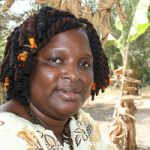|
Marie Jalloh says people are increasingly open to women in leadership roles
|
IRIN DAKAR: When Marie Jalloh first ran for office in 2007, resistance to women in politics in Sierra Leone was so strong she faced harassment and intimidation from local authorities. Now, not only is she a member of parliament; she and other women, along with local NGOs, have brought the country closer to a legal quota for women in decision-making posts. Campaigners say more women in power would go a long way to improving people’s living conditions and fostering development.
A draft bill to be voted on in October, ahead of the 2012 presidential and legislative elections, would require that women hold 14 seats in parliament and four places among the 12 paramount chiefs (traditional leaders), and make up 20 percent of candidates fielded by a political party.
In the 2007 elections female candidates won just 17 out of 112 elected seats, and were not awarded any of the seats allocated to paramount chiefs.
“Female politicians tend to be more development-oriented,” said Barbara Bangura, the national coordinator of Women Solidarity Support Group and the women's NGO Grassroots Empowerment for Self Reliance.
“They tend to be more focused on nation-building – building the home, communities and country through [for example] availability of schools, health facilities, safe drinking water.”
Bangura added: “Failing to eliminate gender inequality in governance has and will continue to have long-term consequences on the development of the country. The exclusion of women from decision-making structures adds to the problems that many Sierra Leonean women face, such as extreme poverty, ill health, less education, sexual and gender-based violence.”
Hopes for October bill
Jalloh is a founding member of the All Political Parties Women’s Association (APPWA) – a platform for women across different parties collaborating to boost women’s participation in politics. She said she was confident the bill, drafted by NGOs, had the support needed to pass in October. “We [lobbied] men to support the enactment of this bill,” she said, adding that men had formed a group to back the move. “We are beginning to see male politicians support women in key positions.”
It is not just men who opposed women entering politics, but culture and tradition have meant many women did not see it as their place, said Nabeela Tunis, who has supported APPWA since 2008 through the UN Integrated Peace-building Mission in Sierra Leone. “[They] had problems with confidence,” she said, adding that APPWA has worked to help women see themselves as potential political candidates.
Inatorma Coomber, a women’s rights project coordinator with Oxfam in Sierra Leone, pointed to President Ernest Bai Koroma’s recent statement of support for the bill as cause for optimism.
But she noted that support was not universal in Sierra Leone. "There are still areas [where people] believe women should not take leadership [positions]."
APPWA members are lobbying for the bill within their own parties and “to make sure women who are strong candidates are put forward”, Tunis said.
Less harassment
Whether or not a legal quota passes, change is already apparent.
“Women now face less harassment and intimidation,” said Jalloh, adding she has not personally faced any since the events in 2007. “Women in the past were victims of political violence but since the inception of APPWA this has changed.”
Oxfam currently runs programmes in two districts, Koinadugu and Kailahun, supporting women representatives on the local council through training in delivering good government services. Getting women into political positions is a multi-faceted process, said Coomber. “You don’t just get women into politics, you give them the tools, build up their capacity so they can deliver and serve as a good example.”
Oxfam also runs education sessions for prominent men – and sometimes women as well – on gender equality. “We show them the benefits of empowering the opposite sex,” Coomber said. “If half your population are not empowered it is harder [for everyone].”
The 2004 Truth and Reconciliation Commission report pointed to the need to boost the role of women in politics: “The institutions and processes of peace, security and development, as well as societies at large, are made stronger and more effective by the full and equal participation of women.”
The report recommended that 30 percent of candidates put forward for all public elections be women, and that the 2014 target should be a 50-50 gender balance in representative politics.



Be the first to comment